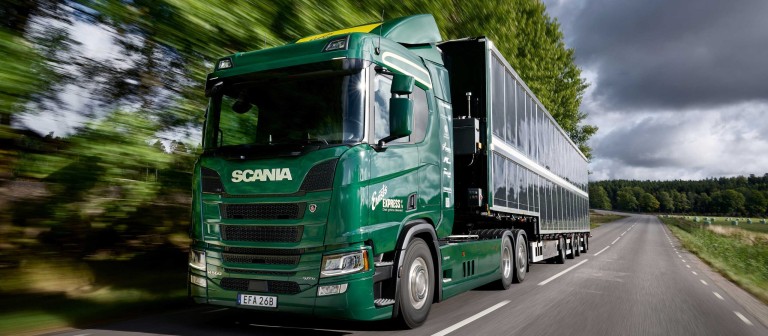The transport industry is undergoing a groundbreaking transformation. The introduction of a revolutionary hybrid truck, featuring an 18-meter trailer with solar panels. This innovative project is a result of a dynamic two-year research collaboration. It involved industry leaders such as Scania, Uppsala University, Eksjö Maskin & Truck, Midsummer, Ernsts Express, and Dalakraft. To harness the power of the sun not only to reduce operational costs, but also to dramatically slash local emissions. This approach by them is paving the way for a greener and more sustainable future in the transport sector.
Scania, an innovator in sustainable transport solutions. It stands at the forefront of this visionary initiative. Stas Krupenia, the Head of the Research Office at Scania, explains the project’s significance. “Never before have we seen solar panels utilized to generate energy for a truck’s power in this manner. This natural energy source has the potential to significantly reduce emissions in the transportation sector. We are thrilled to be leading the charge in the development of the next generation of trucks.”
The hybrid truck is a pivotal component of this research endeavour. At scania they are assessing the energy generated by solar panels and quantifying the reduction in carbon emissions. Beyond enhancing existing solar panel technology for trucks, researchers are delving into how multiple solar-equipped trucks can interact with the power grid.
Erik Johansson, Project Manager and Professor of physical chemistry at Uppsala University, expresses his excitement about the project, stating, “This is an exciting project where academia and industry join forces to reduce the climate impact of truck transports. The insights gained from this unique truck will be invaluable.”
The hybrid truck’s trailer, rest at an impressive 18 meters. It is almost entirely covered in solar panels. The power it generates is equivalent to a residential solar panel setup. In the Swedish climate, this solar infusion extends the truck’s annual driving range by almost 5,000 kilometers. In sunnier regions, the vehicle’s solar energy generation potential can even double, subsequently boosting its driving range.

The project also dives into the realm of innovation with the new tandem solar cells. They are merging Midsummer’s solar cells with perovskite solar cells to achieve higher energy conversion efficiency. These advancements hold the promise of potentially doubling the solar energy generated compared to current panel technology.
Erik Olsson, Head of Corporate Development at Midsummer, states the transformative potential of solar panels for commercial vehicles. “Solar panels are ready for applications that can make commercial vehicles sustainable. We see immense potential for reducing emissions from heavy vehicles through electrification. Electricity generated by solar panels will not only save fuel but also cut down on carbon emissions.”
The project’s scope extends beyond the truck itself. It is to explore the impact of charging the vehicle on the electricity grid. Also, we should look into the possibility of selling surplus energy back. Although two-way charging presents regulatory challenges, it is a promising option for future development.
The real-world testing of this solar-powered hybrid truck is entrusted to the transportation company, Ernsts Express AB. Lars Evertsson, CEO of Ernsts Express, emphasizes the critical role of renewable energy in the trucking industry. Getting energy from renewable sources is without a doubt the way of the future. This is the result of a research project by the government agency of innovation Vinnova. The project’s objective is to develop low-impact climate trucks powered by solar energy. Equipped with a 560-horsepower hybrid engine, the truck has a trailer enveloped in thin, lightweight, and flexible solar panels with a maximum efficiency of 13.2 kWp. These panels are estimated to deliver a substantial 8,000 kilowatt hours annually. The truck’s batteries have a total capacity of 300 kWh, with 100 kWh on the truck and a formidable 200 kWh on the trailer.
This innovative venture stands as a testament to the industry’s unwavering commitment to reducing its carbon footprint. The industry is wholeheartedly embracing renewable energy solutions for a more sustainable and environmentally conscious future in the realm of transport.





Leave a Reply